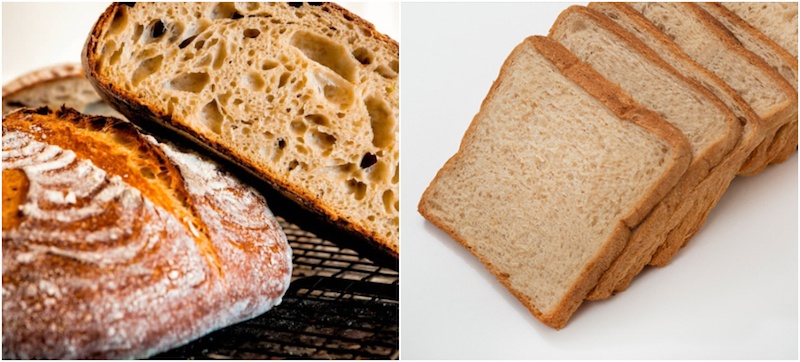Table of Contents
Bread is the most convenient breakfast, literally takes no time to put together, and that’s why it’s a staple breakfast the world over. Especially for busy bees and those living a jampacked schedule, it’s easy to make something with bread that can be grabbed on the go. But over the recent years, the side effects of having white bread on a regular basis has made people stand up and take notice, and look for healthier versions – and “brown bread” emerged as the best alternative. The problem with white bread it has refined carbs that sharply spikes up blood glucose and has a negative effect on appetite. Eating a lot of foods with simple carbs can lead to unhealthy weight gain. But of late, there are other types of bread, such as rye and sourdough bread, that experts say are healthier options. Sourdough in particular is thought to be weight loss friendly too, but the question, is it better than brown bread? Let’s find out:


What is Sourdough Bread?
Sourdough bread is made through long fermentation process using gut-friendly yeast (wild yeast) and lactic acid bacteria such as Lactobacillus alimentarius, Lactobacillus brevis, etc. It takes longer time to ferment than brown bread where baker’s yeast is used. It has a tangy/sour taste and a crusty exterior and soft interior. Also read: “Can I Eat Bread and Still Lose Weight?”
Is Sourdough Better Than Brown Bread?
Brown bread is made with whole wheat, with bran intact, with better fiber content and better nutrient profile. It also has a lower glycemic index than white bread, hence does not spike up blood sugar. However, the problem with most commercially-available brown bread is that it may be colored with caramel coloring and while it may have some amount of whole grain, a lot of brands do add refined flour in it.

A slice of white bread:
80 calories
14 gm carbs
0.3 gm fiber
A slice of Brown Bread (24 gm):
75 calories
8.25 gm carbs
1. 1 gm fiber.
A slice of Sourdough Bread (one serving/64 gm)
174 calories.
19 carbs
10.44 dietary fiber.
Sourdough bread has a glycemic index of 54 and that’s why does not cause sharp fluctuations in blood sugar. Also, with its high fiber content – keeps you fuller for longer and controls appetite.
Experts say protein and fiber play an important role in weight loss. In a 2018 study, a group of people were asked to increase their fiber and protein intake, and these people were able to cut down significant calories and lose weight during a 12-week trial.
Another study done by Canadian researchers involved participants who consumed sourdough bread had stable blood sugar level and were able to maintain this effect during their second meal and for hours after. This happened because the fermentation process likely changed the starches in the bread, making sure they get digested slowly and do not raise blood sugar sharply and spike insulin. This study basically revealed that having sourdough bread for breakfast may help control hunger and appetite through the day, helping in controlling calorie intake.
Also, since sourdough is a fermented food, there is lesser chance for bloating and digestive issues. Remarkably, fermentation helps in reducing phytate (anti nutreints) and increases phytochemicals which are helpful in fighting inflammation. The fermentation process produces short chain fatty acids (such as butyrate, propionate, and acetate) that promote fat metabolism. It also promotes fullness and curbs appetite.
Summing up, sourdough bread scores better over brown bread because it has more nutrients, does not spike blood sugar, and the high fiber content helps boost weight loss. So, if you love bread but want to lose weight as well, swap white bread with sourdough. Also, if you want to know better healthy breakfast options to lose weight, check out our weight loss diet on the Rati Beauty app.
Can I Eat Bread and Still Lose Weight?
7 Healthy Spreads To Slather on Bread

